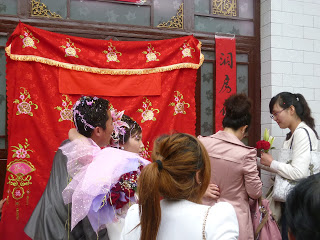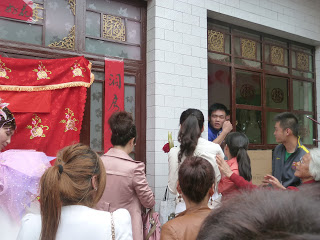Chinese weddings are unlike any weddings I’ve attended; and to be clear, I’ve participated and attended both Jewish, Roman Catholic, and Christian weddings.
First, there is no ceremony per say. The couple is technically, on paper, already married. Therefore the “ceremony” serves two purposes: to receive hordes of money and see friends and family with whom you may not have the chance to see otherwise. 张伟 Zhang Wei’s wedding was no different. He was a high school classmate of Jason’s. Along with Jason, there were three other high school classmates who attended. The wedding was held in Xunyi, the county town, about 20 minutes from Jason’s home. And, as you can also imagine, I was the only foreigner.
The wedding day consists of three major events: picking up the bride and bringing her to her new home, the luncheon, and evening games. The bride cannot enter her new home until the groom’s family presents her with money in red envelopes, called 红包。Additionally, when she arrives all the guests will throw confetti, silly string or set off firecrackers. I was given a can of silly string, which proved to be both fun and a nuisance, as I tried to spray and shoot at the same time. The bride was whisked into her new home via her husband, 张伟, zhang1wei4。All the while, a small band, essentially a trio of traditional Chinese instruments with a keyboard in the mix, played. He carried her in his arms, and even had to wait outside while 红包,hong2bao1, was exchanged. His friends tried to prevent them from entering until they were monetarily compensated. Finally, the exchange was made and 张伟 and his bride entered their new home. Their home, really a room in his parents’ home, was decorated in red and pink balloons as well as the Chinese character 喜喜, xi1xi1 or double happiness.
After the excitement of the bride’s arrival, finally the slow procession to the luncheon began. We walked as their wasn’t enough room in the vehicle procession, consisting of half a dozen cars. The walk was a mere five minutes, but the groom seemed to be embarrassed by the fact that the only foreign guest in attendance had to walk. Frankly, I felt much better walking than stuffing my body into a car with five or six other cramped individuals. Of course, I didn’t find out until several weeks later, via QQ, that he was embarrassed. He profusely apologized for the conditions in which I was placed. Again, to be honest, it really was fine. I’m used to Chinese country living as I have stayed at Jason’s home, even more remote than where the wedding was, twice. Chinese are always apologizing for something, even when it is not in the least bit necessary. Sorry (hah!), I deviated a bit…back to the luncheon. Upon our arrival, photos were taken outside of the restaurant. These photos included me. There was also an MC present, and he introduced the bride and groom as well as both of their families. The introductions were also intended to be a way to formally invite all the guests and warmly welcome them.
Additionally, outside the restaurant’s entrance was a small table where a group of middle-aged men, I presume they were friends or relatives of the groom’s family, presided. Their job solely consisted of collecting 红包 from each guest. They recorded each guest’s name and monetary amount in a ledger. This practice seemed strange to me, but then again other gifts, or a wedding registry are unheard of. In Chinese style, lunch was served family-style. Nothing extraordinary. Most dishes were in fact too spicy for my liking. There was quite a proliferation of dishes I might add. During the meal, the MC served as a form of entertainment, again introducing the couple; I still have no idea when they ate, if they ate at all. When the meal was near completion is when the speeches began. 张伟’s army friend and I were amongst the lucky ones. Yes, you read that correctly, I gave a speech. I spoke both English and Chinese. In English, which Jason then translated on my behalf, I told the eager attendees that this was my first Chinese wedding and I was honored to be in attendance. Then, after Jason’s essential translation, I spoke two Chinese phrases: 祝您新婚快乐!白头偕老。Translation: “I wish you a happy marriage” and “Grow old together”. The most intriguing part of the luncheon happened some time mid-meal: both the bride and groom’s parents were dressed up in ancient-style clothing, with their faces painted, resulting in a clown-like appearance. This was the desired effect as all the guests laughed, photographed, and generally seemed smitten with this unique tradition. Interestingly, this is a regional tradition. Just as there are regional dialects, cuisines, and the like, marriage customs are no exception.
I will only briefly explain what was meant by evening games, as was explained to me by Jason. In the evening, all of the groom’s friends gathered at the couple’s new home, and thus commenced the most bizarre part of the entire “ceremony.” In ancient China, sex was even more taboo than in contemporary China. Therefore, you can expect that no “birds and the bees” talk was ever transmitted by parents, elders, friends etc. Because of lack of education, women and men really didn’t know much about what to expect on their wedding night. This applies in particular to women. Therefore, even in ancient China, the groom’s friends, who themselves were most likely already married, served a very unique purpose of helping a couple understand what constitutes a “wedding night.” It was also undoubtedly the first time the couple would even sleep in the same bed together. So, as is tradition, games served as instruction. The games were littered with innuendos and allusions, but nothing was ever explicitly talked about. I was forewarned about the certain “vulgar” language, but by American standards it didn’t seem all that bad to me. I imagine most was lost in translation. A little translation happened as well as due to context, I could stab at the implied meaning. It was interesting, to say the least.
 |
| Flowers for the bride |
 |
| The car procession. This was the car that the bride rode in, so it was the most heavily decorated. |
 |
| The newlywed’s home. |
 |
| There was a lot of free time; some of the guests played Majiang (Mahjong). |
 |
| The arrival of the bride. |
 |
| Giving the bride 红包 hongbao (lucky money). |
 |
| The groom must carry the bride into their new home. |
 |
| They must wait for money to be exchanged before entering their new home. |
 |
| Some of Zhang Wei’s friends wouldn’t let them in until money was exchanged. |
 |
| The bride. |
 |
| The luncheon |
 |
| Psuedo-maid of honor. There isn’t any hierarchy of bridesmaids. |
 |
| Both the bride and groom’s parents were dressed up in costumes, complete with clown-like face paint. |
 |
| After the luncheon, Jason and I visited his parent’s home, a 20 minute motorbike (my first!) ride from Xunyi county town. Trying on a traditional Chinese jacket. Jason’s mother will make me one. The one I am wearing is meant for men. A women’s is more shapely and brightly colored. |















